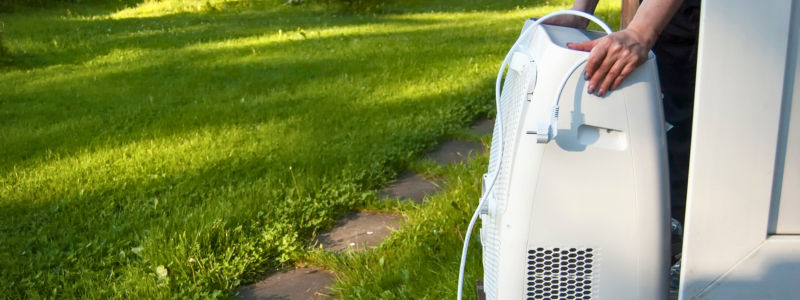Discover the Cool Truth About Portable Air Conditioners

Sweating through summer in a home without central air? You might be considering a portable air conditioner to keep you cool. But are they worth the investment? These devices promise flexibility and convenience, but how well do they perform? In this comprehensive guide, we’ll explore the pros and cons of portable air conditioners, helping you decide if they’re the right solution for your cooling needs.
What is a Portable Air Conditioner?
Portable air conditioners are standalone units designed to cool individual rooms. Unlike central air conditioning or window units, they don’t require permanent installation. Instead, they use a hose to expel hot air out of a window, making them ideal for renters or anyone needing a temporary cooling solution.
The Purpose of a Portable Air Conditioner
Keeping You Cool
The primary function of a portable air conditioner is to remove heat and humidity from a room, transferring it outside. They can be particularly useful in spaces without central air conditioning, such as bedrooms, guest rooms, basements, and home offices.
Dehumidifying
High humidity can make the heat feel even more oppressive and contribute to respiratory issues and mold growth. Many portable air conditioners also act as dehumidifiers, reducing the moisture in the air and making your home more comfortable.
Temporary Use
Portable air conditioners are perfect for temporary living situations or rental properties where permanent installations aren’t an option. They’re also great for supplementing central HVAC systems in areas that generate a lot of heat, like kitchens and home gyms.
How Do Portable Air Conditioners Work?
Pulling in Hot Air
A fan moves air over the air conditioning coils, which cools the air and extracts humidity. This cooled air is then circulated back into the room.
Transferring Heat
The refrigerant inside the unit absorbs heat from the air, changing from a liquid to a gas in the process. This absorbed heat is then transferred outside.
Expelling Exhaust
A window venting kit expels the hot air and moisture outside, ensuring that the room’s temperature remains cool and comfortable.
Pros of Portable Air Conditioners Roll from Room to Room
Designed with mobility in mind, portable air conditioners come equipped with wheels, allowing you to move them from room to room as needed. Perhaps you need it in your home office during the day and the bedroom at night? No problem! They tend to be lightweight, making them easier to lift and transport, even if you live in a home with stairs.
Easy Setup with No Permanent Installation
Unlike window AC units, which are often restricted by apartment buildings and HOAs, portable air conditioners can be set up in any room with a window. Plus, the initial setup requires no heavy lifting or professional help. Just find an exit for the exhaust hose in a window, and you’re done. Unlike window units, which can block your view and incoming light, a portable air conditioner hose takes up only a fraction of your window space.
Take it on the Road
Summertime often means road trips, but staying cool in trailers, RVs, or pop-up campers can be challenging. Many don’t come with reliable cooling systems. A portable air conditioner can be an easy fix, ensuring you stay comfortable wherever your travels take you.
Cools and Dries at the Same Time
Most portable air conditioners are two-in-ones; they cool and dehumidify the air. This dual functionality is particularly beneficial in humid climates where high humidity can make you feel uncomfortable. Keeping your home dry also helps mitigate allergies by reducing mold and dust mites. Many units even feature a dehumidifier-only mode for year-round use.
Cons of Portable Air Conditioners Inefficiency and High Energy Bills
Portable air conditioners typically have lower Energy Efficiency Ratio (EER) ratings compared to in-home systems, meaning they use more energy. They cool less efficiently, causing you to run them longer and at higher settings, which can lead to increased energy bills.
Noise Pollution
While central air conditioners usually operate at sound levels between 40 to 60 decibels (dB), portable units can be louder, often exceeding 58 dB and sometimes reaching up to 70 dB. This noise level isn’t unsafe but can disrupt conversation and affect your quality of life.
Water Drainage Hassle
Portable air conditioners require a drainage method for the water produced from condensation. Some units drain out of a window, while others have drain pans that need to be emptied regularly. Forgetting to empty the tank can lead to flooding, a safety hazard that can cause mold or damage if left too long.
Limited Placement and Venting Issues
Since portable AC units need to vent hot air outside, your options for placement are limited. This can be a decor dilemma and may block light in your home. Depending on the unit, you might also need to make alterations to your windows for the venting process.
Short Lifespan and Higher Maintenance
Portable air conditioners generally don’t last as long as their counterparts and may require more repairs and maintenance as they age. They’re less sturdy and break down sooner than built-in air conditioners.
Difficulty Cooling Large or Open Spaces
Small portable units often aren’t powerful enough to cool large rooms or homes with open floor plans. They may start “short cycling” or turning on at full blast, cooling only the air directly around the thermostat, and then shutting off before the entire room is cooled.
Potential for Mold and Mildew Growth
The moist and dark interior of an air conditioner can be a common site for mold and mildew growth. Dust and organic matter can build up on the filters if they aren’t cleaned regularly, contributing to this problem.
Limited Functionality
Unlike full HVAC systems or heat pumps, which can switch between hot and cold air, small portable AC units only provide cooling.
Potential Safety Hazards
Standalone AC units can pose tripping hazards due to the hoses and cords needed for drainage and power. They can also raise security concerns if you need to leave a window open for venting.
Alternatives to Portable Air Conditioners
Central Air Conditioning
If your home has ductwork, central air conditioning can be an efficient and long-lasting solution. However, the initial installation can be costly.
Ductless Mini-Split Systems
Ideal for homes without ductwork, ductless mini-split systems have an indoor and an outdoor unit connected by tubing and wiring. They’re usually mounted on a wall out of the way.
Upgraded Window AC Units
Newer window AC units are quieter and have a lower profile than older models. They’re more powerful and better able to cool larger spaces.
Frequently Asked Questions About Portable Air Conditioners
How Often Do I Need to Drain the Water Tank?
Depending on the size and type of air conditioner, you may need to drain the tank between once a day and once a week. Check the tank often if it doesn’t have an alarm or indicator light.
How Long Do Portable AC Units Typically Last?
A typical portable AC lasts 5 to 10 years, depending on usage and maintenance. While they can be a good short-term solution, a more permanent air conditioner is a better option for long-term use.
Can an HVAC Expert Help Me Assess My Cooling Needs?
Yes, an HVAC expert can help you assess your home’s cooling needs and suggest the best solution. They can check indoor air quality, recommend the right type of air conditioner, and provide high-quality service using advanced techniques.
Can a Portable AC Unit Cool a Large Room?
A large portable AC unit can potentially cool a large room. It takes about 8,000 BTUs to cool 350 square feet, so a larger room would need at least a 10,000-BTU unit.
Do All Portable Air Conditioners Have to Be Vented Out of a Window?
While most portable air conditioners need to vent hot air outside, not all have to be vented out of a window. Some can be vented through walls or ceilings.
Do Portable Air Conditioners Use a Lot of Electricity?
Yes, portable air conditioners generally use more electricity than comparable window units. They can be less energy-efficient, leading to higher energy bills.
Conclusion
Portable air conditioners offer a convenient and flexible solution for cooling individual rooms, especially in situations where permanent installations aren’t possible. They come with a range of benefits, including easy setup, mobility, and dual functionality for cooling and dehumidifying. However, they also have their drawbacks, such as inefficiency, noise, and maintenance needs.
If you’re considering a portable air conditioner, weigh the pros and cons carefully to determine if it meets your needs. For those seeking a more long-term solution, alternatives like central air conditioning or ductless mini-split systems might be worth exploring.
Ready to experience the convenience of a portable air conditioner? Give our office a call today, 480-460-1487 to find out more about the portable air conditioners we have to offer.
